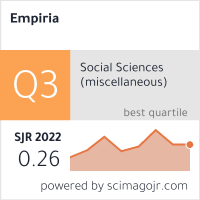The process of a longitudinal qualitative research on the transition to motherhood and fatherhood in Spain
DOI:
https://doi.org/10.5944/empiria.41.2018.22603Keywords:
qualitative method, interview, couple relationships, sociology of gender, qualitative research validityAbstract
We present the methodological process of a qualitative, longitudinal and collaborative research on the transition to motherhood and fatherhood in Spain. We have interviewed double income couples in two time of their life cycle, during pregnancy of the first baby and between one year and a half and two years after birth. This longitudinal research has four advantages 1. The changes of ideas, plans and attitudes can be studied without biases of selective memory, something usual in the access to retrospective information. 2. Working as a team and in a collaborative way allows us to obtain a wide sample formed by two socioeconomically and homogeneous sub-samples, being able to access the diversity of discourses with enormous analytical potential. 3. Studying both members of the couples, -their practices, perceptions and justifications-, enriches the analysis compared to studies that have only the perspective of one partner, and allows us to better analyze topics that suffer from biases of political correctness such as those related to gender, motherhood and fatherhood. 4.Demonstrating, specifying, and justifying the methodological process guarantees the quality and validity of the substantive research, providing information of archive and back room.
Downloads
Downloads
Published
How to Cite
Issue
Section
License
Los autores que publican en esta revista están de acuerdo con los siguientes términos:a) Los autores conservan los derechos de autor y garantizan a la revista el derecho de ser la primera publicación del trabajo al igual que licenciado bajo una Licencia Internacional Creative Commons CC BY-NC-SA 4.0.
b) Se permite y se anima a los autores a difundir electrónicamente las versiones pre-print (versión antes de ser evaluada) y/o post-print (versión evaluada y aceptada para su publicación) de sus obras antes de su publicación, ya que favorece su circulación y difusión más temprana y con ello un posible aumento en su citación y alcance entre la comunidad académica.










